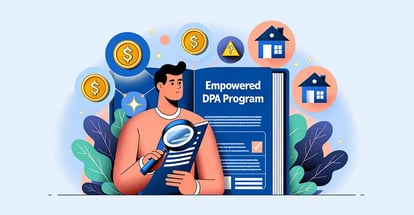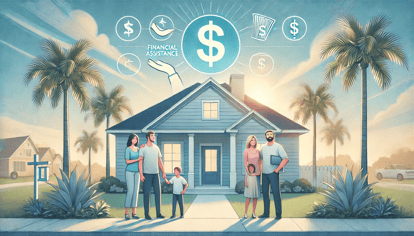The Ultimate Guide to the Chenoa Fund - Requirements and Eligibility in 2023
Let's dive deeper into what the Chenoa Fund is, how it works, and see if you qualify.
Chenoa Fund Program Options
The Chenoa Fund, as part of its initiative to support homebuyers, offers various program options tailored to individual needs.
These options determine the amount of down payment assistance and the terms associated with repayment or forgiveness.
Here's a closer look at the four primary program options available:
3.5% Repayable
-
Down Payment Assistance - Provides homebuyers with a 3.5% assistance to be used for the down payment.
-
Terms - This option requires the borrower to repay the provided assistance amount in full. Typically, it offers favorable repayment terms, with low-interest rates and a specified repayment duration, making it easier for borrowers to manage alongside their primary mortgage.
- Suitable For - Those who expect a stable financial future and are confident about repaying the assistance over time.
3.5% Forgivable
-
Down Payment Assistance - Offers 3.5% assistance for the down payment.
-
Terms - Unlike the repayable option, a portion or even all of this loan can be forgiven over a specified period. This means that after a certain number of years, if the borrower meets the program's conditions (like staying in the home), they might not need to repay the provided assistance.
- Suitable For - Homebuyers who are unsure about their long-term financial capability or those who plan to stay in their purchased home for a longer duration.
5% Repayable
-
Down Payment Assistance - Provides a more significant assistance amount of 5% for the down payment.
-
Terms - As with the 3.5% repayable option, borrowers need to repay this assistance. It's designed to cater to homebuyers looking at properties that might require a higher down payment. The repayment terms remain favorable, with low-interest rates.
- Suitable For - Those who are looking at homes that might be slightly above the average price range but are confident about their repayment capabilities.
5% Forgivable
-
Down Payment Assistance - Grants homebuyers with a 5% down payment assistance.
-
Terms - The forgivable nature means that after a set period, provided the borrower meets specific conditions, a portion or all of the loan can be forgiven, and they might not owe anything.
- Suitable For - Homebuyers eyeing more expensive properties but are looking for some flexibility in down payment assistance repayment.

Requirements to Qualify for Chenoa Fund
Navigating the world of homeownership can be daunting, but understanding the requirements can make the process smoother.
If you're considering the Chenoa Fund for down payment assistance, here are the key qualifications you need to be aware of:
Credit Score
To be eligible for the Chenoa Fund, borrowers are required to have a minimum credit score of 600. This ensures that beneficiaries have a history of managing credit responsibly.
Income Limits
The Chenoa Fund is geared towards assisting those who might not have vast financial resources. Therefore, there's an income cap in place.
Typically, your income should not surpass a specified limit, which is usually set in comparison to the median income of your locality.
This structure ensures the program aids those genuinely in need.
FHA Mortgage Qualification
Before you can benefit from the Chenoa Fund's down payment assistance, you must qualify for an FHA Loan.
It's important to note that the Chenoa Fund doesn't provide the main home loan, but instead aids in the down payment.
Debt-to-Income Ratio (DTI)
Financial health isn't solely based on income; it's also about managing your debts.
The DTI ratio is a critical metric that measures your monthly debt obligations against your monthly income. To qualify for the Chenoa Fund, applicants often need to maintain their DTI below a specified maximum.
This ensures that you're in a stable financial position and not overly burdened with debt.
Primary Residence Requirement
The goal of the Chenoa Fund is to promote homeownership, not real estate investment. As such, the home you aim to buy using the Chenoa Fund assistance should be your main residence.
This stipulation means properties intended for investment or as vacation homes are excluded from the program.
Is the Chenoa Fund Only For FHA Loans?
When considering homeownership and exploring financial aid options, understanding loan compatibilities can be crucial.
The Chenoa Fund, while being a significant boon for many potential homeowners, comes with its specific set of guidelines.
One of the most notable is its exclusive compatibility with FHA loans. but what does this mean, and why is it essential?
FHA loans refer to mortgages insured by the Federal Housing Administration (FHA). These loans are popular among first-time homebuyers because they often come with less stringent credit requirements and lower down payments compared to conventional loans.
Why is Chenoa Fund Exclusively Compatible with FHA Loans?
Both the Chenoa Fund and FHA aim to boost homeownership among groups that might find it challenging to enter the housing market, such as first-time buyers or those with limited financial resources. This shared mission makes their integration seamless.
FHA loans are known for their low down payment requirements, often as low as 3.5% of the purchase price. The Chenoa Fund's down payment assistance can cover this amount, making homeownership even more accessible.
Since FHA loans are designed to be more forgiving concerning credit scores, they align well with the Chenoa Fund's objective of aiding a broader demographic of potential homeowners.
By working exclusively with FHA loans, the Chenoa Fund can better predict and manage the risks associated with the down payment assistance they provide. The predictability of FHA loan structures and guidelines aids in this risk assessment.
If you're considering the Chenoa Fund, it means you'll also need to qualify for an FHA loan. This exclusivity ensures that the assistance provided is channeled into a recognized, federally-insured mortgage program, which adds an extra layer of security for both the borrower and the Chenoa Fund.
In conclusion, the unique relationship between the Chenoa Fund and FHA loans represents a carefully designed system to support potential homeowners.
It's a marriage of two programs, each complementing the other, to make the dream of homeownership a reality for as many people as possible.
If you're keen on benefiting from the Chenoa Fund's assistance, familiarizing yourself with FHA loan requirements would be the next logical step.
Benefits of FHA Loans
FHA loans, insured by the Federal Housing Administration, have grown in popularity, especially among first-time homebuyers.
This growth can be attributed to the distinct advantages they offer. Let's delve into the core benefits of FHA loans:
Lower Down Payments
One of the primary attractions of FHA loans is the minimal down payment required, often just 3.5% of the purchase price.
This reduced upfront cost can make homeownership more attainable for many who might struggle with a larger down payment.
Flexible Credit Requirements
FHA loans are more forgiving when it comes to credit scores.
Even if you have a lower credit score, you might still qualify for an FHA loan, whereas conventional loans might be out of reach.
Rate Stability
FHA loans predominantly come with fixed interest rates, ensuring your monthly mortgage payments remain consistent throughout the loan's life.
This stability aids in budgeting and financial planning.
Protection for Borrowers
In cases of financial hardship, such as job loss, the FHA offers certain provisions to help borrowers.
These measures can include options for temporary relief or loan modifications to make repayment more manageable.
Assumability
An often-overlooked feature is that FHA loans are assumable.
This means if you decide to sell your home, the buyer can "assume" or take over your loan, potentially making the property more attractive or facilitating a quicker sale.
Higher Debt-to-Income Ratios
FHA loans tend to have more generous allowances concerning how much of your income can go towards debt payments.
This can be especially beneficial for those with significant existing debts or higher living expenses.
Refinancing Opportunities
FHA offers streamlined refinancing options for borrowers who want to reduce their interest rate without going through the usual appraisal or income verification processes.
In summary, FHA loans provide a suite of benefits tailored to make homeownership more accessible, especially for those who might find traditional financing routes challenging.
Whether it's the lower down payment, lenient credit requirements, or borrower protections, FHA loans have established themselves as a viable and attractive option for many prospective homeowners.
Chenoa Fund Frequently Asked Questions
How does the Chenoa Fund work?
Under the Chenoa Fund™ program, qualified buyers may receive a second mortgage to cover their 3.5% minimum down payment requirement when purchasing an FHA-insured home or the 3% minimum down payment required on a FNMA conventional loan.
What is the income limit for Chenoa?
In the Chenoa Fund Repayable Second program, there are no income restrictions for the borrower.
Who is eligible for the Chenoa Fund?
For all Chenoa Fund DPA products for FHA Loans, borrowers need to have a credit score of 600 or higher.
The Repayable option has a 10-year term with an interest rate 2% higher than the FHA first mortgage and requires monthly payments.
What is the debt to income ratio for Chenoa Fund?
For borrowers with current housing payments and credit scores between 620-639, the maximum debt-to-income (DTI) ratio is 45%.
If a borrower exceeds payment shock or DTI requirements, they should refer to alternative qualification requirements. However, the DTI should never exceed 50%.
What are the benefits of the Chenoa program?
With the Chenoa Fund™ DPA for FHA Loans product, borrowers can receive either 3.5% or 5% down payment assistance on an FHA loan.
This aid can be applied towards the down payment, closing costs, prepaid items, or a combination of these.
Is the Chenoa Fund legitimate?
Yes, the Chenoa Fund is funded by CBC Mortgage Agency (CBCMA), a federally chartered government agency.
Is Chenoa for first-time homebuyers?
Absolutely. The Chenoa Fund™ has prominently served the U.S. first-time homebuyer market, completing over 10,000 mortgage transactions since 2013.
Are Chenoa loans forgiven?
Yes, under specific conditions.
For the 3.5% down payment, the loan is forgiven after 36 consecutive, on-time payments are made on the FHA first mortgage.
For the 5% down payment, it's forgiven after 120 consecutive, on-time payments on the FHA first mortgage.
Bottom Line
The Chenoa Fund represents a beacon of hope for many aspiring homeowners, especially those who find the hurdle of a hefty down payment too challenging.
By providing vital assistance, the program bridges the gap between dreams and reality, facilitating the homeownership journey.
Its exclusive partnership with FHA loans ensures a structured and reliable framework, giving borrowers peace of mind.
Whether you're a first-time homebuyer or someone reentering the housing market, understanding the nuances of programs like Chenoa can make all the difference.
It's not just about securing a roof over your head; it's about building financial stability and investing in the future.
With over 50 years of mortgage industry experience, we are here to help you achieve the American dream of owning a home. We strive to provide the best education before, during, and after you buy a home. Our advice is based on experience with Phil Ganz and Team closing over One billion dollars and helping countless families.

About Author - Phil Ganz
Phil Ganz has over 20+ years of experience in the residential financing space. With over a billion dollars of funded loans, Phil helps homebuyers configure the perfect mortgage plan. Whether it's your first home, a complex multiple-property purchase, or anything in between, Phil has the experience to help you achieve your goals.


 By
By  Edited by
Edited by 






